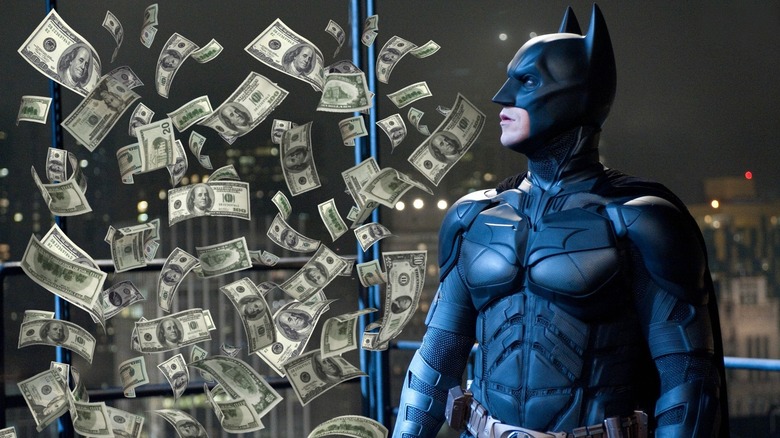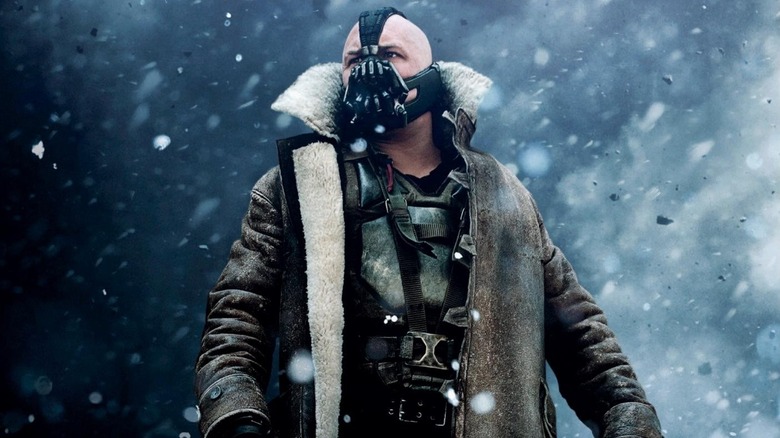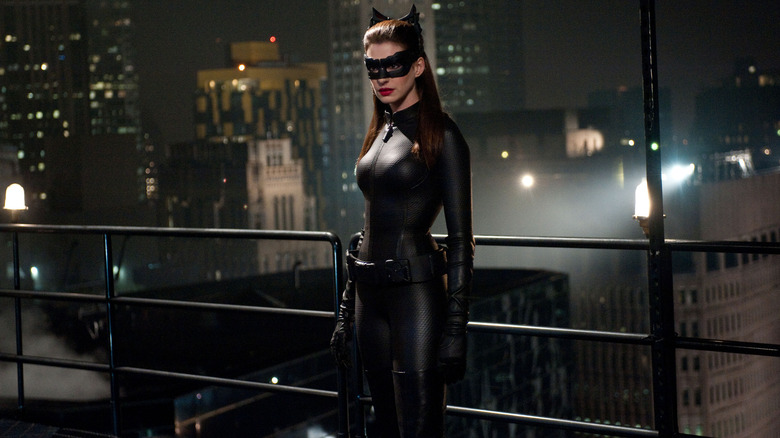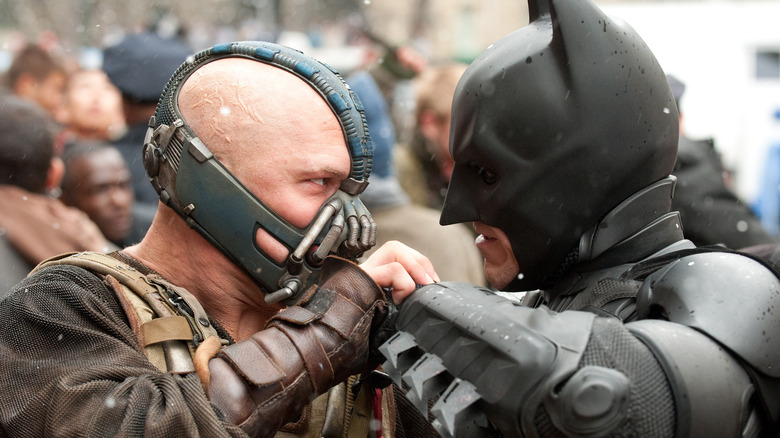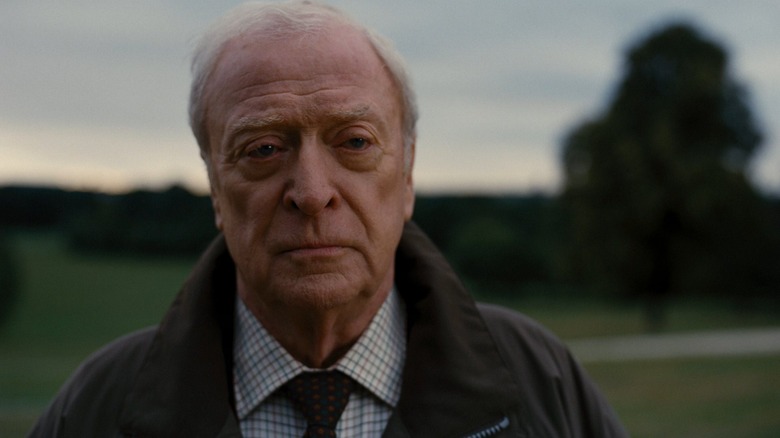Tales From The Box Office: The Dark Knight Rises Gave DC An Ending When It Needed A Beginning
(Welcome to Tales from the Box Office, our column that examines box office miracles, disasters, and everything in between, as well as what we can learn from them.)
There are few movies of any kind that have managed to garner the sort of love amongst the masses that 2008's "The Dark Knight" has. From movie critics to your average joe, it's a film that seemingly everyone loves. It netted Heath Ledger an Oscar for his legendary performance as the Joker and helped establish Christopher Nolan as one of the premier blockbuster storytellers we have working today.
But how does one follow something like that? Especially without the Joker and after crafting another mind-bending, huge success in "Inception." Well, Nolan had to try to measure up to that gargantuan task with "The Dark Knight Rises," which concluded his "Batman" trilogy with somewhat mixed results. Or perhaps it was just that the film couldn't live up to the sky-high expectations set by its predecessor. Either way, history has not been quite as kind to the trilogy-capper.
"The Dark Knight Rises" ended one era and, in a roundabout way, signaled the beginning of another; Warner Bros. and DC Films were getting ready to launch a shared superhero universe in the following years, kicking off with 2013's "Man of Steel." The idea was to catch up to Marvel in the cinematic universe game and yet, at a time when DC was looking to begin something new, its biggest success was coming to an end.
In honor of the film's 10th anniversary, we're looking back at "The Dark Knight Rises," how it was made in parallel with the very beginnings of the Snyderverse, how its success put Warner Bros. and DC in an unenviable position, and the lessons we can learn from it in hindsight. Let's dig in, shall we?
The movie: The Dark Knight Rises
When "The Dark Knight" became a gigantic, Oscar-winning success story blowing "Batman Begins" out of the water commercially speaking, there was no way Warner Bros. wasn't going to make a third movie starring Christian Bale's Batman and with Nolan behind the camera. Straight-up. But Nolan took some time and made "Inception" in between installments which, in turn, proved to be great for Warner Bros. as that movie also earned a lot of Oscar love and a huge $826 million worldwide. The Caped Crusader came calling once again immediately thereafter, with Nolan and Bale getting ready to finish what they started back in 2005.
This time, they were going to have to cook up a new villain, since the tragic passing of Ledger several months before the release of "The Dark Knight" meant the Joker couldn't return. So, Nolan and his brother, Jonathan Nolan, wrote a script with Bane as the main villain, holding Gotham City hostage with the creation of a gigantic bomb. Rising star Tom Hardy was cast in the role and beefed up to play the muffle-masked, hulking baddie. Catwoman was also in the mix, played by Anne Hathaway, who served as more of an ally than a villain once things settled. In truth, Nolan, speaking in late 2008, revealed that he was weary of taking on a third film, for various reasons:
"Is there a story that's going to keep me emotionally invested for the couple of years that it will take to make another one? That's the overriding question. On a more superficial level, I have to ask the question: How many good third movies in a franchise can people name? [Laughs.] At the same time, in taking on the second one, we had the challenge of trying to make a great second movie, and there haven't been too many of those either. It's all about the story really. If the story is there, everything is possible."
The cinematic universe rises
When "The Dark Knight" arrived in 2008, the Marvel Cinematic Universe hadn't even been established yet ("Iron Man" had only just become a surprise hit). But by 2012 when "The Avengers" became a record-breaking success, everything had changed. As such, the thinking at Warner Bros. had to change in regards to its handling of DC. Enter Zack Snyder, who was set to film "Man of Steel" in the summer of 2011, mere months after Nolan kicked off production on "The Dark Knight Rises." Two parallel lines running at the same time: a conclusion for Bale's Batman and the beginning of Henry Cavill's Superman, representing the future.
Given that Nolan is actually the one who pitched the original idea for "Man of Steel," it's not surprising that he served as a producer on the film, and even less surprising that there was consideration put into the idea that Snyder's film would exist in the same universe as "The Dark Knight" trilogy. "It was not 100 percent off the table. We did talk about it a little bit," Snyder revealed on the Happy Sad Confused podcast in 2021. In the end the chips didn't fall that way; if there was ever going to be a Batman in that universe, it wouldn't be Bale.
The point is, Warner Bros. and DC were wandering down two very different paths at the same time and industry trends set by Marvel were dictating where the future was headed. But before they could be concerned with the future, they had to give audiences an ending and that ending would burst into theaters in the summer of 2012 — setting a new standard for the DC brand at the box office and, as a result, setting difficult expectations for the brave new future that would follow soon thereafter.
The financial journey
"The Dark Knight Rises" hit theaters on July 20, 2012, and it blew away the competition. Nolan's $250 million-budgeted grand finale debuted to $160.8 million in North America, easily besting the likes of "Ice Age: Continental Drift" and "The Amazing Spider-Man" that weekend. Even though it suffered a relatively steep fall in its second weekend, dropping 61.4% for another $62.1 million, the movie was well on its way to a gigantic finish. It wrapped up its run with $448.1 million domestically and $632.9 million internationally for a grand total of $1.08 billion. The only movies that made more money that year were the aforementioned "Avengers" and "Skyfall," which remains the highest-grossing "James Bond" movie in history.
At the time, "The Dark Knight Rises" was the highest-grossing DC film in history, making even more than "The Dark Knight" ($1 billion) and managing to hold the record for six years until, amazingly enough, "Aquaman" stole the crown with $1.14 billion. It was a resounding success, even when taking that huge budget into account. Critics and audiences didn't like it quite as much as the previous film (again, the burden of expectations did this movie no favors) but time has been kinder to it.
In any event, it meant that Bale's Batman was wildly popular, Nolan's take on the universe on DC's most popular hero was fresh in everyone's minds, and "Man of Steel" was getting ready to kick off a new cinematic universe the following summer. One simply can't have a DC universe without Batman and so, scarcely a year after "The Dark Knight Rises" hit theaters, Ben Affleck was cast as our new Bruce Wayne in August of 2013 for Snyder's follow-up, "Batman v. Superman: Dawn of Justice." That film leaves behind a complex legacy, and one that DC Films is still living in the shadow of.
The lessons contained within
Now, as far as lessons connected directly to "The Dark Knight Rises" are concerned, I'm not here to discuss quality as that's pretty subjective. I personally like this film a lot more than most even if it's not out-and-out as good as "The Dark Knight" (and, let's be real, few things are). Nolan came in, finished what he started, and gave us all an ending. In an era when so few things are allowed to end because of franchise needs feeding corporate mandates, there is perhaps a lesson in simply allowing something to end on its own terms. That feels oddly special a decade removed.
In the larger context, Warner Bros. very much felt the need to catch up with Disney in the cinematic universe game by the time "The Dark Knight Rises" was in theaters. "Man of Steel" hadn't even been released yet and it was clear that the studio was going all-in on the Snyderverse, with "Batman v Superman" being announced at San Diego Comic-Con that summer. Rather than make "Man of Steel 2," Warner Bros. decided that launching a connected universe with a new Batman was prudent. Given how hard it has been for the so-called DC Extended Universe to establish itself in the years since, and given that this year's "The Batman" introduced Robert Pattinson as yet another version of the hero, it's hard to say it was precisely the right decision.
For me, this all comes back to not putting the cart before the horse. "The Dark Knight Rises" succeeded by staying in its lane and doing what it needed to do. As a result, Warner Bros. has one of the most beloved and successful trilogies of all time. If the studio had taken a slower approach to the DC cinematic universe, who knows? Maybe things would be different. Maybe there would be a truly cohesive DCEU, rather than several different franchises within an expanding multiverse for audiences to keep track of.
I'm not saying the current multiverse strategy won't pay off, I'm merely saying that the relative failure of "BvS" and the debacle that followed with "Justice League" didn't help matters, and much of that had to do with Warner Bros. trying to do too much, too fast. Nolan avoided that with his iteration of Batman, and the results speak for themselves.
